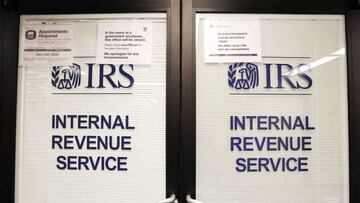US stimulus check: what to do if I receive IRS money by mistake
The third round of direct payments is being sent out but some Americans have reported getting the wrong amount from the tax authority. Here's how to check what to do.

Over 130 million Americans have now received the third stimulus check, but some have found that the amount is not what they expected – either too high or too low.
Those who have been eligible for all three of the stimulus checks since the start of the pandemic will have been entitled to a maximum of $3,200 in direct payments; not much to last for an entire year. Here’s everything you need to know if you were sent the wrong amount.
Do I have to return IRS money if incorrect?
If you discover that your stimulus payment was too high – or higher than you the amount you were expecting, the Internal Revenue Service (IRS) will generally not expect you to return the sum which has been overpaid. There are, however, some exceptions to this.
The following are examples where a clear error has been made in the distribution of the stimulus check, meaning that the IRS would expect you to return the money:
- Receiving a check for someone who has died, with some exceptions.
- You don't have a Social Security number.
- You're considered a "non-resident alien" without a US citizen spouse.
- You're a noncitizen who files federal taxes.
- You exceed the adjusted gross income threshold.
It is worth noting that the IRS has said that if you receive an amount that you are only partially entitled to then you should keep that part and return the rest, 'immediately'. For example, as a spouse to someone in prison you would be entitled to half the full amount.
The IRS is continuing to issue stimulus checks, even as the bulk of the $1,400 payments have already been distributed to eligible Americans. But among those still waiting are some people who receive benefits through the U.S. Department of Veterans Affairs. https://t.co/FJGCdj9V9m
— CBS Mornings (@CBSMornings) April 6, 2021
How to return the incorrect stimulus check
As advised by the IRS you should return the payment as described below.
If the payment was a paper check:
- Write "Void" in the endorsement section on the back of the check.
- Mail the voided Treasury check immediately to the appropriate IRS location listed below.
- Don't staple, bend, or paper clip the check.
- Include a note stating the reason for returning the check.
If the payment was a paper check and you have cashed it, or if the payment was a direct deposit:
- Submit a personal check, money order, etc., immediately to the appropriate IRS location listed below.
- Write on the check/money order made payable to “U.S. Treasury” and write 2020EIP, and the taxpayer identification number (social security number, or individual taxpayer identification number) of the recipient of the check.
- Include a brief explanation of the reason for returning the EIP.
Mailing addresses for your location can be found here.
Stimulus checks: IRS will correct miscalculated payments claimed on tax returns https://t.co/dnOCNNvvAP by @denitsa_tsekova pic.twitter.com/57XD1Ahhm5
— Yahoo Finance (@YahooFinance) April 6, 2021
What if the payment was lower than expected?
Related stories
If the amount you received was much less than you had anticipated, there is not much you can do about it now unfortunately. If a mistake has been made with your application, you may have to wait until next year to get it resolved.
If you think your stimulus check payment is wrong and is too low, you will have to wait until next year’s tax season (expected to be 1 January-15 April 2021) to put forward your claim when you file your tax return for 2020. Then wait to see if you will be reimbursed.

